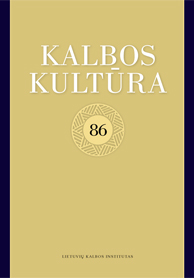Europos Sąjungos Teisingumo Teismo generalinio advokato išvadų leksinių analitinių konstrukcijų vertimas iš prancūzų kalbos į lietuvių kalbą
Translation of Lexical Analytical Constructions in the Opinions of the Advocate-General of the Court of Justice of the European Union from French into Lithuanian
Author(s): Aurelija Leonavičienė, Dalia LiepuoniūtėSubject(s): Lexis, Baltic Languages, Translation Studies
Published by: Lietuvių Kalbos Institutas
Keywords: lexical analytical construction; translation method; administrative style; norm of standard language;
Summary/Abstract: Over the past twenty years the translations of EU documents into Lithuanian have been on the increase; the development of the administrative language has been gathering pace as well. As a result of cross-linguistic influence, the texts of administrative style started featuring new, occasionally ill-founded, linguistic peculiarities selected by translators. Lexis was the fastest to react to changes; certain stylistic differential features of the use of lexis underwent changes as well. In the analysis of the use of words from the Lithuanian administrative language, the comparison of the texts of two languages – source text and its translation – is a source yielding numerous valuable data. The relevance of the topic under analysis is determined by frequent errors of translation from analytic (English, French, etc.) languages into a synthetic Lithuanian language as well as the disregard of the peculiar characteristics of the native language system, norm and stylistic use.The article analyses the opinions of the advocate-general of the Court of Justice of the European Union in French and Lithuanian languages. Lexical analytical constructions characteristic of the French administrative language and their translation into Lithuanian were selected the research object. The study material consists of 444 pages of the opinions of advocate-general of 2003–2013 divided into two comparative periods: texts written in 2003–2008 and in 2009–2013. The total number of words in the documents under analysis is 221,041 words. The distinction of the material under analysis into two periods enables to identify the methods of translating lexical analytical constructions under analysis into Lithuanian as well as the changes in the quality of translation over the past ten years. The following objective was brought forward in the study – to analyse the quantitative use of French lexical analytical constructions in the opinions of the advocate-general and to identify the methods of their translation into Lithuanian.The study is based on contrastive linguistics, quantitative and descriptive methods. The analysis results lead to the conclusion that in translating 705 French lexical analytical constructions found in the study material into Lithuanian and rendering their reference content, the component synthesis of semantic structures was usually selected, i.e. it is translated by a verb or its forms (60.2% of all examples under analysis), less commonly – by a noun construction (34.8% of the examples). Translation by a noun (3.5% of the examples), adjective, adjective and verb phrase (0.9% of the examples) and adverb (0.3% of the examples) are considered least common translation methods. To avoid semantically and stylistically excessive units, 0.3% of translation examples omitted lexical analytical constructions altogether. The methods of translation identified in the study lead to the conclusion that the selection of linguistic means in the target language depends on translator’s expertise, understanding of the meaning of the unit being translated and the knowledge of stylistic and genre peculiarities of the target language.The comparison of translation examples from the two periods in terms of the norm of the Lithuanian standard language shows that the translation quality of the EU documents is gradually improving; translators become more careful with regard to the peculiarities of the source and the target language, semantics of language units and are better versed in the norms of the Lithuanian standard language applicable in the administrative language.
Journal: Bendrinė kalba (iki 2014 metų – Kalbos kultūra)
- Issue Year: 2013
- Issue No: 86
- Page Range: 95-111
- Page Count: 17
- Language: Lithuanian

